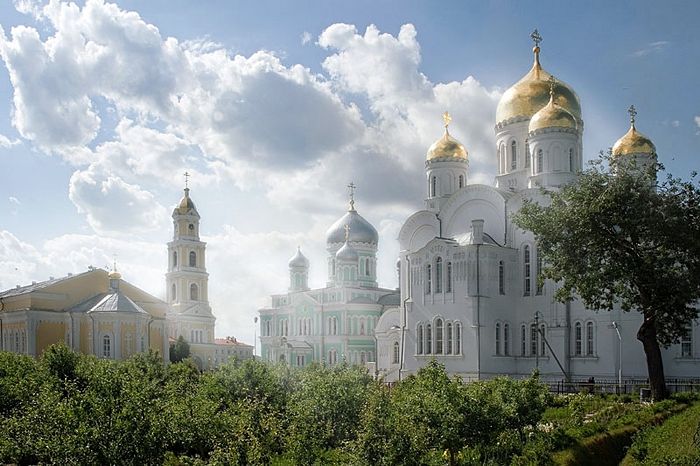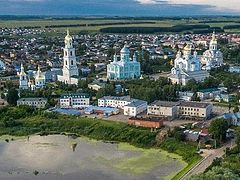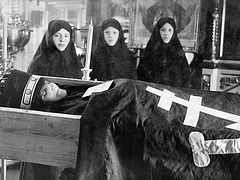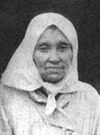On the day of the synaxis of all the saints of Diveyevo, we post these thoughts of a pilgrim, to remember the Diveyevo nuns—the many dedicated servants of God and daughters of St. Seraphim whose labors perhaps only God and the saint know.
Pilgrims who visit Diveyevo Monastery to pray most likely know the words of Father Seraphim about Diveyevo nuns: “Upon whomever intercedes for them and helps them, God’s great mercy will pour out.”
And any Orthodox Christian has heard the saying, “Obedience is higher than fasting and prayer! And you should not only never refuse to do it—you should run to it!”
We left Moscow at night and arrived in Diveyevo by morning. We left our car in the parking lot, and rushed to the Holy Trinity Cathedral to venerate the relics of St. Seraphim of Sarov. There was a large crowd of people. The inner doors were shut, and standing on the upper steps to the entrance we prepared ourselves for a wait. Then a nun’s voice rang out to everyone in general and no one in particular saying, “Brothers, who would like to do some work in the Canal of the Theotokos for the glory of God?”
“Of course it’s nice to work for God,” I thought to myself faintheardedly, “but we have so little time and so much to do. We have to go to confession, receive Communion, go to the holy springs, take pictures of ourselves, fill our water containers, get some holy oil and St. Seraphim’s blessed bread, take a dip…”
After that, events followed that taught me to better understand that passage in the Life of St. Mary of Egypt where an unknown force prevents her from entering the church. When I would listen to this desert-dweller’s life during Great Lent or read it at home, I thought that the unknown force that wouldn’t let her into church was a literary allegory depicting the sinful woman’s inner battle. Now I understand that this was no metaphor but a reality.
Having venerated the relics of St. Seraphim I went to the priest for confession and took my place in the queue. Well, every time it seemed that my turn had come, at the last minute a grandma would hobble up before me, or a nun, or a sick child in a wheelchair. Some force was shoving me away from the priest. The queue kept moving forward, but I kept moving backward. The early Liturgy ended. No problem, I went to the late Liturgy. The queue moved on but I walked in place. Again, I didn’t make it to the priest for confession.
I waited for the evening service. Again I didn’t manage to confess—the pilgrims arriving by huge busloads act precisely and efficiently; they squeeze out anyone not from their group with strong shoulders and sharp elbows. The day ended with a procession around the Canal of the Mother of God with my prayer rope. “Here for you is Jerusalem, and Athos, and Kiev!’ Father Seraphim would say.
Day two, and still no confession. By the end of the day my anxiety level had reached the limit, and in my conversation with Mother Zinaida, who had settled us into the guesthouse, I complained that after two days of visiting Diveyevo I still had not confessed or received Communion, and tomorrow I have to return to Moscow. Matushka looked at me attentively and said, “We’ll pray. Tomorrow you’ll receive Communion.” I of little faith remained unsatisfied with that answer, and I didn’t have much hope in the strength of prayer. I wanted her to take me by the hand and lead me to confession! The third day of my visit to Diveyevo began.
In the morning at the early Liturgy I stood amidst the pilgrims like a Pharisee amidst the publicans and waited for the beginning of confession, not entirely counting on success. However the result exceeded my boldest expectations—having absolved two or three people, the priest looked attentively over our tightly packed crowd, and his gaze literally hitting me, summoned me over with his finger. Not believing my eyes I gestured to him for reassurance—“Do you mean me?”
Covering me with his epitrachelion, batiushka instructed me for a long time on the path to salvation, cauterizing my wounds with burning words. It was the first time in my life that I had confessed so deeply, with tears. Finally batiushka absolved my sins, blessed me, and kissed my cheek with the words, “You can be helped. Pray.”
Stepping aside and finding myself right in front of the “Tender Feeling” icon of the Mother of God, I couldn’t regain my composure for a long time and was ashamed of my tears. Right then I understood very much, and as they say, could now see… I understood why we pray to the Theotokos, “Grant me a stream of tears of Most Pure One, and cleanse my soul from filth.” I left the church a different man. I wanted to love and embrace the whole world. And when the nun at the exit stopped me to ask if I would carry a stack of books and icons upstairs my joy was boundless. I shot over like a comet and threw myself at the stack. The nuns took note of my zeal and gave me a reward—dried bread blessed in batiushka Seraphim’s iron pot.




